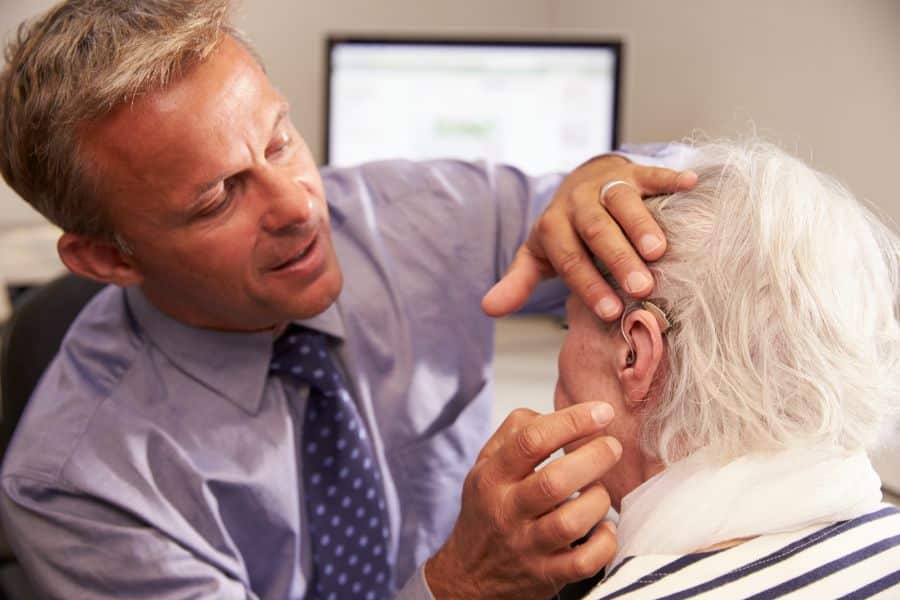
Hearing loss is a common problem that affects a lot of older people. It can make it hard for them to communicate and enjoy social events as they once did. Thankfully, hearing aids and personal sound amplifiers can help those with hearing issues hear clearer and continue participating in activities they enjoy. While both hearing aids and personal sound amplifiers work toward the same goal, how they work, what features they have, and how well they do it are different. With companion care at home and loved ones’ support, seniors can acclimate to both and have the support they need to hear better.
How Can Hearing Aids Help Seniors?
Hearing aids are high-tech medical devices made for people who have trouble hearing. They are made to fit the needs of the person who wears them, considering their lifestyle, level, type of hearing loss, and personal tastes. Modern hearing aids use advanced technology to improve sound clarity and make it easier to understand speech.
- Most hearing aids have three parts:
- A microphone that picks up sound.
- An amplifier that makes the sound louder.
- A speaker or receiver that sends sound to the ear.
Also, many hearing aids today have digital signal processing, making it possible to eliminate noise, stop feedback, and change sound settings. They can even help with issues of tinnitus.
Hearing aids come in different styles and shapes, so everyone can find one they like. They can be put behind the ear or in the ear canal, based on the comfort and hearing needs of the person who wears them. Some types even have wireless connections to stream music directly from smartphones, TVs, or other compatible devices. Companion care at home and loved ones can help seniors with the technical side of hearing aids and encourage them to wear the aids consistently.
What Are Personal Sound Amplifiers?
Personal sound amplifiers (PSAs), also called “personal amplification devices” or “sound enhancers,” are not considered medical devices and do not need a prescription. They can be purchased over the counter without the help of a doctor or pharmacist. PSAs are usually less expensive than hearing aids, which makes them a good choice for people on a tight budget.
PSAs are designed to make sounds louder in different situations, like when people talk, watch TV, or attend events. Like hearing aids, they have a microphone, an amplifier, and a receiver. PSAs, on the other hand, are not designed or made to fit a person’s hearing profile like hearing aids are. They make sounds louder in a more general way, but they don’t have the fine-tuning and signal processing that hearing aids do.
PSAs can help some people with mild hearing loss or as a short fix, but they may not be the best way to help others with their hearing needs. PSAs are not tested as thoroughly as hearing aids and do not have to meet specific standards for sound quality, safety, or user experience. It’s important to know that hearing aids from a professional are usually the best choice for people with moderate to serious hearing loss. With the help of companion care at home, seniors can determine if PSAs might be good for their environment.
The choice between hearing aids and personal sound boosters comes down to what seniors need. It’s a good idea to also discuss their options with a trained hearing specialist team.
Sources:
https://www.forbes.com/health/hearing-aids
https://tweakhearing.com/hearing-amplifiers-for-the-elderly/
https://www.theseniorlist.com/hearing-aids/hearing-aid-vs-personal-sound-amplifier/
The staff at Home Care Matters is available to talk with you and your family about all of your needs. Home Care Matters is a home care agency providing quality and affordable companion care at home in Hoschton, GA, and the surrounding areas. Call (770) 965-4004 for more information.
We provide elder care in Braselton, Buford, Dacula, Duluth, Flowery Branch, Gainesville, Johns Creek, Lawrenceville, Oakwood, Sugar Hill, Suwanee, Barrow County, Forsyth County, Gwinnett County, Hall County, Jackson County, North Fulton County.
Valerie has the unique experience with home care as she has experienced it from both ends of the spectrum, as a caregiver and as needing care herself as a cancer survivor. Valerie says, “Taking care of someone you love is a physically, mentally and demanding labor of love.Taking care of my mom was the hardest thing I have ever done. It has given me an insight and perspective not many people understand unless you are doing it or have done it.I loved taking care of my mom.I love helping others take care of their love ones too.And now that I’ve been sick, it’s given me a whole new level of empathy and understanding for those who are sick and need help.”
Valerie’s schedule varies daily, but she loves visiting with our clients, families, caregivers, our network partners and being in the office.Says Valerie, “Every day is different, but I wake up excited about what we do, inspired by our team, clients and caregivers.I strive to be a resource to the community.I love my team and I love what we do every day. I like to think my mom would be proud.”
You can reach Valerie by email (Valerie@homecarematters.com) or in our office (770.965.4004).
- How In-Home Alzheimer’s Care Helps Your Parent Stay Safe and Comfortable - December 26, 2025
- After the Fall: How Home Care Helps Seniors Recover Safely at Home - December 19, 2025
- Supporting Seniors with Memory Challenges Through Compassionate Senior Home Care - December 12, 2025
